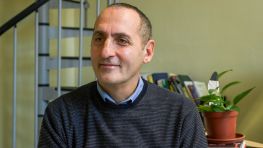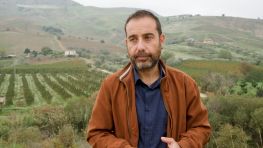 Marinella Ferrari
Marinella Ferrari Sebastiano Conti
A Sicilian Organic Rice for Arancini
Sebastiano Conti, born in 1967, is the owner of Agribio Conti Farm, located in Lentini. The farm was founded in the 1970s by the Ferrari brothers, originally from Emilia, who transformed the marshy lands of the Lentini Plain into a productive and innovative area through agronomic improvements. Specifically, by cultivating *sulla* (a nitrogen-fixing plant), implementing crop rotation, and channeling water, they succeeded in regenerating and enhancing the land.
In 2006, Sebastiano took over the entire farm, succeeding his father and continuing the work of crop and product diversification. During this process, almost as a playful experiment, he began cultivating rice with the support of two professors from the University of Catania, inspired by the idea of making arancini from organic ingredients grown and produced in Sicily. From the beginning, the results were exciting in terms of both productivity and quality, encouraging Sebastiano to gradually expand the area cultivated for rice.
The interview highlights some distinctive aspects of Sebastiano's rice cultivation methods, which take into account the unique climatic and soil conditions of the Lentini Plain, quite different from those of the Po Valley.
Video table of contents
- The Ferrari brothers and their work to improve the land through the cultivation of sulla, rotation and the canalization of water.
- From Sebastiano's father, to the purchase of the entire company in 2006.
- Growing rice to make arancini from organic Sicilian raw materials.
- The need to invest in equipment to gradually close the supply chain and make Sicilian rice independent.
- The cultivation system adopted: minimum tillage after mowing the forage crops, drainage channels, surface irrigation.
- Rice and malaria in Sicily.
- The idea of bringing rice back to Sicily: an idea that I liked.
- Minimum tillage due to fertile soil in the first few centimetres of depth: knowing your land.
- A farmer from Piedmont among my fields might suspect that chemicals are used in the fields: we don't have weeds, we are truly organic.
- You do organic because you believe in it and it makes you feel good. The value of organic. A family value, economically sustainable.
- The absence of plants competing with rice.
- The first year we followed the techniques used for the other crops with excellent results.
- The need to close the rice supply chain in Sicily.
- A rice with its own identity.
- A plant that impoverishes the soil and requires long rotations.
- Our rotation system.
- Water management and Consortia: a fundamental and highly critical point.
- The difficulty in reconciling the needs of farmers with the rhythms of irrigation consortia, the inefficiencies of the public machine.
- Organic farming in Sicily.
- The change in fauna with rice cultivation.
- Rice cultivation is perceived with great interest and curiosity by Sicilians.
- Irrigation of fields and the need to cultivate on suitable soils.
- Because we are the only ones to produce rice in Sicily, the difficulties and the hope of being reached by others.
- The lack of contributions and little help: the need to proceed step by step.
- My model can be replicated in Sicily.
- I started growing pleurotus mushrooms when I was 19.
- Close the supply chain to encourage the spread of rice cultivation in Sicily.
- The propensity to innovate and diversify.
Interview information
Country: IT
Region: Sicilia
City: Lentini
Suburb: Contrada Cuccumella
Urls: Agribio Conti
Sebastiano Conti
Date of birth: 10-03-2024
Profession: Farmer
Languages: Italiano
Document by: Luca Ghiardo
Video by: Luca Ghiardo, Vincenzo Sottosanti
Created: 08-11-2014
Questo video fa parte del seguente archivio
Rice stories
Rice stories
Food is a fundamental resource for man and his health, both through the supply of nutrients and the ability to embody traits of human culture that play a leading role in our well-being.
Over time, each territory has built original ways in which to relate to the fruits of its land, enriching them with rituals, symbolic meanings and culinary customs. Much of these relationships have been lost following the years of the economic boom, with the exodus from the countryside to urban centers, with the advent of agriculture for mass production and ultimately with the globalization of markets and the consequent impoverishment of the heritage of biodiversity and ethnodiversity.
The purpose of this archive is to collect evidence relating to the main rice production area in Europe, that is the Po Valley, and to investigate, through the analysis of textual sources and testimonies collected in the field, both what survives of this heritage, and the ways in which which has evolved and reached us, paying particular attention to the explicit and implicit links that bind food and health.






